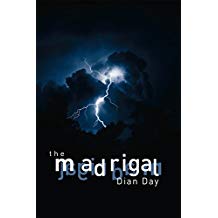Frederick is a youngest son (and only singleton) with six raucous brothers; a one-time musical child prodigy; subject of the benevolent index finger of God; victim of Everything Crashing Down, in public, just one month after his eighteenth birthday.
In mid-life, he is deliverer of Canada Post mail; teacher of Voice; keeper of secrets; caretaker of his demented mother; lousy with dates.
Everything is under control. Until a new neighbour moves in next door, unwelcome letters fill his mail bag, the date that matters gets away, and God once again starts pointing—but this time He seems a little cranky.
I was the aberration in my family: a single child. My mother had three sets of identical twins, and then me. Two boys, two boys, two boys. At least if I had been a girl it would have been some consolation for all of us. But I was not; I was the seventh boy, as unremarkable as anyone’s child, born without my other half.
My mother favoured 3-syllable names that could be shortened to one sharp sound:
Nicholas
Nathaniel
Samuel
Salvador
Abraham
Alistair
Frederick
On summer evenings she would stand on our broken front step at dusk and yell down the street, in a steady rhythm like a metronome set precisely at ninety-two: Nick-Nat-Sam-Sal-Abe-Al-Fred! My brothers would run like hungry wolf cubs to the den, for the promise of meat—my mother learned early that the only way to lure them in for bath and bed was with food. She held off supper until it was almost dark. Once they were all inside I crawled out from behind the scraggly elderberry bush, where I’d sat for hours, picking the scabs from my insect bites and listening to the robins defend their territories with song.
I don’t like people to call me Fred.
When I was a child my Winchester cousins called me Fred Mad. They never tried this with any of my brothers; teasing a team was a lot riskier than tormenting a singleton.
I never knew my Madrigal cousins, since my father left my mother just after I was born. I grew up believing that he, too, found it unacceptable that I was born a lone child.
Of course, my family drew a lot of attention. Three sets of identical twins out of the same mother is a very rare thing. It’s fraternal twins, apparently, that tend to run in families. After the SS was born, it was bad enough. After AA came along, there was almost constant attention from the university. Every week, graduate students would call my mother asking if the twins could participate in some research study or other. She always said yes—for a fee. My six brothers advanced the causes of biology and psychology to no end. You can read about them in any of the books on twins that profligate the shelves of more serious bookstores. One myopic student, Jenny Glass, even wrote a whole dissertation on The Madrigal Twins, but she accidentally drowned in Lake Ontario a week before her defence date. The university let my mother have a copy of the draft; it sat curling on the kitchen shelf—a place of honour—with the chipped imitation-Dalton figurine, the shell from Hawaii sent by her best friend Clara, and the good luck penny she’d found the day she met our father.
When my mother was pregnant with me, a reporter from the National Enquirer camped out in the empty lot across the street for pretty much the whole duration of her third trimester. When my parents came home from the hospital with one meagre child tucked under one of my father’s arms, the reporter packed up and went home to Boca Raton, Florida. Since I was born in February, he was probably doubly unimpressed.
*

